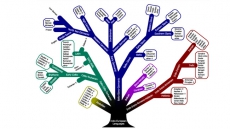Have you ever felt as if there’s too much going on? Not enough hours in the day? Can’t seem to find the time between the kids, work and other commitments? How do the most successful people – those who have even more on their plates than most of us – manage to conquer the world and do it all with ease?
After studying and coaching top performers for more than 30 years, Steve Siebold, author of 177 Mental Toughness Secrets of The World Class, and a psychological performance and mental toughness coach, says it comes down to 10 ways of taking on life and managing time:
Keep things in perspective: “Most people crack under pressure because they lose their perspective. Their fear of losing overwhelms them to the point of physical, emotional and spiritual breakdowns,” Siebold says. “List the three events that cause you the most stress on a regular basis, and ask yourself what you need to do to put these things into proper perspective, to reduce or eliminate the stress.”
Compartmentalize: “Most people get bogged down in the details of every little problem, yet some people are able to manage multiple problems and maintain emotional control while solving them individually,” Siebold says. “This is called compartmentalization. Commit to compartmentalizing your problems by focusing exclusively on one problem at a time. While most people multi-task, the great ones focus.”
Escape excessive cognition: “The enemy of creativity and clarity is excessive cognition, or having too many thoughts to process at the same time. Cognitive overload is a major problem for many of us,” Siebold says. “Schedule some time to get away and be alone with your thoughts. Investing in solitude will keep the mind rested, fresh and able to focus. The simple greatest asset you can give yourself is the ability to think with a clear mind.”
Master Follow Up: “Most people over-promise and under-deliver. It’s not that they don’t have good intentions, they become forgetful trying to balance too many things at once,” Siebold says. “Keep a pen and paper with you at all times or make a note on your Smartphone to do the things you say you are going to do. Follow through inspires confidence and fosters trust.”
Don’t be addicted to the approval of other people: “A lot of people value the opinions of other people over their own. It’s conformity at all costs and zaps all of your energy,” Siebold says. “Next time you wonder ‘what if’ people don’t agree with you or won’t like you, reframe the question to ‘so what if’ they don’t? What’s really the worst thing that will happen?”
Learn to say ‘No:’ “If you’re a ‘yes’ person and always agree to help with additional favors, projects and other requests for your time, it’s taking away from other things you could be doing,” Siebold says. “It’s great to help others, but it’s also perfectly acceptable to say ‘no’ from time to time. People aren’t going to dislike you or stop being your friend because you say no. Time is your most valuable resource.”
Develop a world-class work ethic in all you do: “When it comes to getting results, most people manage to produce average results and do just enough to get by. They’re worried about time, but the reality is they have more time than they realize if they cutout meaningless activities like watching TV and playing on Facebook,” Siebold says. “Whether it’s your career, a personal relationship or anything else, develop a world-class work ethic of GSD (Get Stuff Done) and watch your productivity and results go through the roof.”
Be future oriented: “Most people dream of the good ole’ days and never get anything done. The only thing significant about the past is how it affects us in the present and future,” Siebold says. “Stop looking in the rearview mirror wishing things were different. Don’t play the victim game. Be focused on ‘living in the now.’ Focus exclusively on the present and future.”
Develop a sense of urgency: “Most people operate like there is an endless amount of time in a day, week, month year and life, and constantly procrastinate,” Siebold says. “To be more productive, you need to be more sensitive to time. Life is short. Go after things with a sense of urgency and learn to think about life as if there’s no tomorrow.”
Become a problem solver: “People who manage to do it all are focused on solving problems. They aren’t worried about being recognized or given credit for what they accomplish.” Siebold says. “Drop your ego and reach out for help when you have too much on your plate. Learn to delegate. You’re human, after all, and there’s no shame in turning to others for help.”





